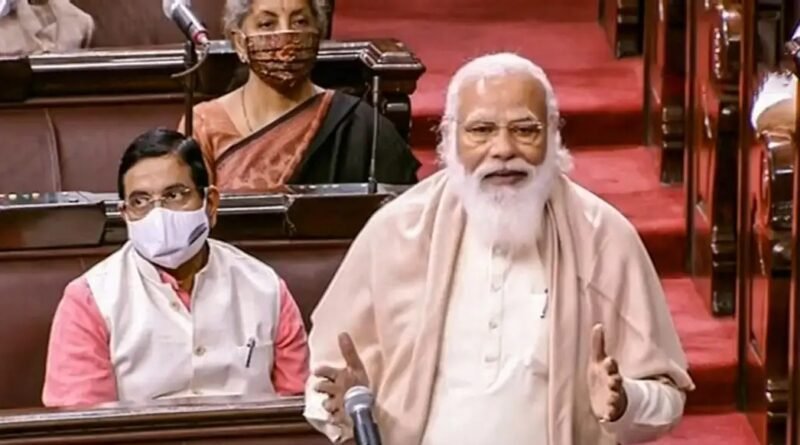‘Babu samjho ishare’ — Modi’s critique of IAS evokes shock but many also call for introspection
New Delhi: In 2016, the IAS Association took strong exception to the growing use of the word ‘babu’ to refer to officers. The then president of the IAS Association, along with several other serving officers, called the word an “abuse” for Indian civil servants.
Five years later, when Prime Minister Narendra Modi called IAS officers “babus” and derided the “babu culture” on the floor of Parliament, shock is being expressed in hushed tones even as some described it as a much-needed call for introspection by the community.
While doffing his hat to the private sector Wednesday for its contribution to the growth and development of the country, Modi questioned the “power centre we have created in the country by handing over everything to babus”.
“Sab kuch babu hi karenge. IAS ban gaye matlab woh fertiliser ka kaarkhana bhi chalayega, chemical ka kaarkhana bhi chalayega, IAS ho gaya toh woh hawai jahaz bhi chalayega. Yeh kaunsi badi taakat bana kar rakh di hai humne? Babuon ke haath mein desh de karke hum kya karne waale hain? Humare babu bhi toh desh ke hain, toh desh ka naujawan bhi toh desh ka hai,” Modi said.
(Babus will do everything. By dint of becoming IAS officers, they’ll operate fertiliser warehouses and also chemical warehouses, even fly aeroplanes. What is this big power we have created? What are we going to achieve by handing the reins of the nation to babus. Our babus are also citizens, and so are the youth of India.)
For most officers, the PM’s statement was a rare and emphatic public denouncement of the whole IAS community by the highest office of the country.
However, it also came as a surprise to many since Prime Minister Modi’s model of governance has involved heavy reliance on a select few IAS officers — often at the cost of ministers.
From extending the services of handpicked officers and keeping them in key posts, including the PMO, far beyond their regular tenures, to establishing one-on-one relationships with secretaries and even district magistrates across the country — the PM has been known to count on his rapport with IAS officers to govern the country, and, before that, his home state Gujarat.
A ‘concerned community’
A secretary-level IAS officer said on the condition of anonymity that he could not recall an earlier instance where the Prime Minister “questioned the fundamental premise of the IAS in this manner”.
“There have been solitary instances where politicians have derided individual officers…When Rajiv Gandhi as Prime Minister rebuked his foreign secretary in a press conference, it was seen as an affront to officers, but still it was an individual officer,” said the officer.
T.R. Raghunandan, a former IAS officer who is an adviser with the accountability initiative of the think tank Centre for Policy Research (CPR), agreed.
“It will not be an exaggeration to say that what the PM has said is a death knell for the IAS,” he said. “The whole argument for the need of specialists is not new, but this is a statement on the supine bureaucracy, which has kowtowed to politicians for decades… It should make them ask themselves what this kowtowing has fetched them,” he added.
Anil Swarup, former union secretary to the Government of India, said the comment cannot be seen as an off-the-cuff remark.
“When I was working in the government, the PM was very forthcoming when it came to IAS officers. His statement is a cause of concern and introspection,” he said. “There are officers who have worked with him for 5-6 years now, they need to introspect on what has gone wrong with the IAS,” he added.
Not the first time
Since coming to Delhi in 2014, Modi has on several occasions — either privately or obliquely — taken aim at the civil services over allegations of corruption and status-quoism.
In his 73rd Independence Day speech, he likened corruption to “termites” and said his government took several steps to remove corrupt government servants from cushy positions.
“You must have seen, in the last five years, and this time after coming to power, we have dismissed several people who enjoyed cushy positions in the government,” he said. “Those who used to be roadblocks in our endeavours, we told them to pack their bags (because) the country doesn’t need (their) services,” he added.
After returning to power in 2019, in a closed-door meeting with senior officers of the government, Modi was reported to have said that they had “spoiled” the first five years of his government, and he would not let him spoil the next five.
Union minister Nitin Gadkari made similar remarks last year. At an event in Nagpur, Gadkari said, “A day before yesterday, I was in the highest forum, where they were saying that they (officers) will start this and that. I told them why would you start? If you had that potential then why were you working here as an IAS officer? You should have started a big business. You should help those who can do it. We are the facilitators. You shall not be involved in it.”
To tackle the problem of status-quoism and perceived lack of expertise among civil servants, who are routinely shuttled between different departments, the Modi government also introduced its ambitious lateral entry scheme to involve domain experts in decision-making — a scheme it expanded last week by inviting more applications.
‘Need for introspection’
While IAS officers privately acknowledge the problems of accountability, permanence of tenure, and inefficiency within the civil services as major issues inflicting the system, some point towards a “doublespeak” in the matter.
It is true that the government needs experts for sectoral intervention that technocrats can provide, but it also needs inter-sectoral interventions and political engagement, which even this government uses IAS officers for, said an officer. “Then why simply echo the commonly-held disdain for IAS officers? Governance is more nuanced than that.”
The PM continues to rely on select officers immensely, and reward them for merit, competence or loyalty, the officer said.
“There are so many officers who have been rewarded for their performance or loyalty, even post-retirement… There may not be anything wrong with it,” the officer added. “But if they are largely good for nothing, then why reward them? Lateral entry is one thing, but nothing stops the government from having experts head commissions and tribunals. Then why is it that this government continues to give post-retirement jobs to IAS officers? Why not bring in experts there?”
Yet, most officers ThePrint spoke to said there is a need for introspection by the IAS community.
“The reason that the IAS community will find it hard to speak up against this affront is because it has little credibility,” said Raghunandan. “They have not spoken up for so many decades now, but I think this should remind them that the political executive also turns contemptuous of you if you show uncritical loyalty.”
Another IAS officer who is still serving in the government pointed towards a more practical problem. “I think the IAS community has for far too long had a holier-than-thou attitude where they have simply dismissed the private sector as corrupt and greedy, and viewed profit creation as an evil thing,” the officer pointed out.
“The remarks of the PM make it amply clear that this can no longer be our attitude, and, as those with positions of power in the government, we have to engage with the private sector more meaningfully. If anything, this statement tells me it is time for IAS officers to shed their arrogance,” he said.
A CPR survey published this month appeared to corroborate the claim that most IAS officers view the private sector with a “striking disregard and suspicion”.
“The Prime Minister has made it amply clear that the private sector has to be treated like an ally, it would be foolish for the babu to not get the ishara,” the officer said, referring to a popular song from the 1958 Hindi film Chalti Ka Naam Gaadi. (The Print)



